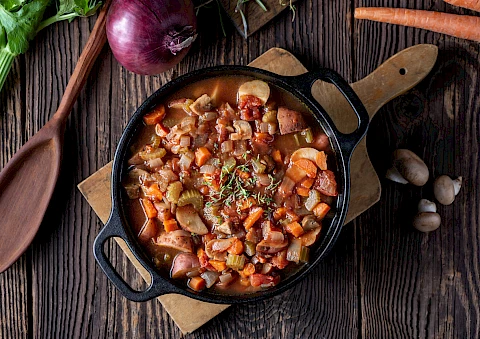
As winter sets in and the temperatures drop, there's nothing like enjoying classic comfort foods. For seniors, maintaining good nutrition during the colder months is crucial. Nutritious meals can boost energy, support health, and keep the immune system strong. However, it can be challenging to make beloved winter recipes both healthy and suitable for seniors' dietary needs.
Senior Nutritional Needs
Seniors often have specific dietary needs due to changes in metabolism, digestion, and general health. Many face restrictions such as low sodium, low sugar, or gluten-free diets, which call for careful meal planning.
Nutrient-dense foods provide necessary vitamins and minerals without excess empty calories. As you adapt recipes, prioritize ingredients that are rich in fiber, lean proteins, and healthy fats while steering clear of overly processed components. Simple swaps can make a big difference, ensuring that meals are both delicious and beneficial for seniors.
Classic Comfort Foods With a Healthy Twist
Soups and stews are quintessential winter dishes, offering warmth and satisfaction. To boost their health benefits, start with a low-sodium broth base. Fresh vegetables like carrots, kale, and bell peppers not only enhance flavor but also add essential nutrients. For extra protein, include lean meats or plant-based proteins like lentils. Whole grains such as barley or quinoa can make the soup heartier without losing nutritional value.
Comforting casseroles can be modified to reduce fat and sodium. Replace heavy creams with low-fat milk or yogurt, and consider using herbs and spices to punch up the flavor without adding salt. Whole grains and beans can be excellent additions, supplying fiber and protein. Think about substituting white pasta with whole-grain or legume-based varieties, which offer more nutrients and a satisfying texture.
Satisfying a sweet tooth doesn't mean sacrificing health. Instead of refined sugars, opt for natural sweeteners like honey or maple syrup. Whole fruits can also sweeten desserts while adding fiber and vitamins. Consider heart-healthy swaps like using almond flour instead of regular flour or Greek yogurt as a base for creamy desserts. These changes can make treats both wholesome and delicious.
Easy Preparation Tips
Preparing meals should be an enjoyable experience rather than a chore. Time-saving kitchen gadgets, such as slow cookers or food processors, can make meal prep more manageable for seniors.
Batch cooking allows for convenient meals that can be frozen and reheated as needed. Cooking can also become a social activity; inviting family members or caregivers provides both assistance and camaraderie in the kitchen.
Adapting Recipes for Dietary Restrictions
Navigating dietary restrictions doesn't have to be daunting. Many recipes are easily adapted for gluten-free, low-sugar, or low-sodium diets. Consider gluten-free grains like quinoa or rice, and explore low-sodium seasonings that enhance flavor.
Encourage creativity by experimenting with different ingredients and cooking techniques to accommodate various dietary needs. Flexibility in the kitchen can lead to discovering new favorite dishes.
Reimagine Winter Comfort Foods
Healthier winter recipes are not only achievable but also rewarding for seniors. These makeovers retain the classic flavors we love while promoting better health and nutrition. By incorporating these recipes into your winter meal plan, you're ensuring a more nutritious and enjoyable season.
For those seeking personalized senior care and assistance with meal prep in Lakewood, Toms River, Manchester Township, Brick, and throughout Ocean County, contact us at Senior Helpers Ocean County today.